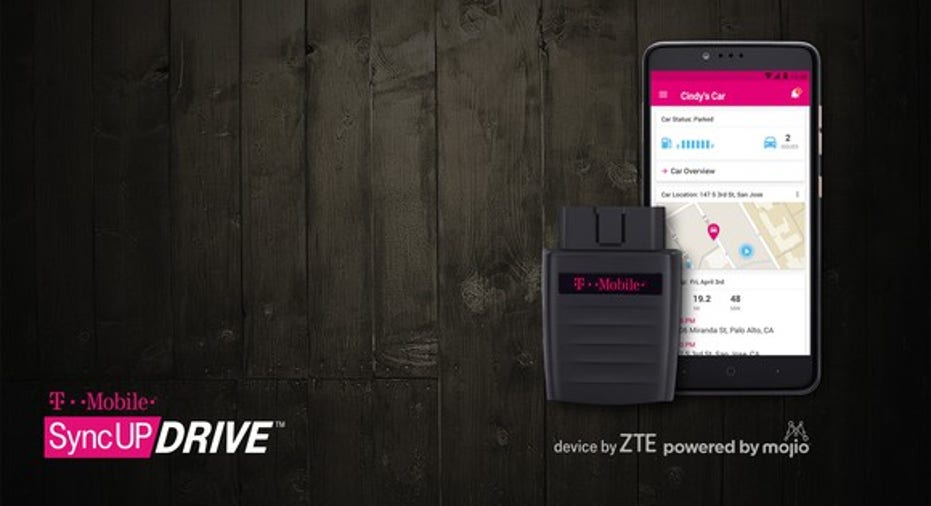T-Mobile Is Ready to Drive Away With More of AT&T's Customers

Image source: T-Mobile.
The number of connected cars on the road has increased significantly over the past couple of years. One of the biggest beneficiaries of the trend has been AT&T (NYSE: T), which has partnerships with 19 different auto manufacturers to install connectivity in their vehicles.
T-Mobile (NASDAQ: TMUS) CEO John Legere has often pointed out that AT&T is using connected-car net adds as a way to mask its "flailing consumer wireless business." Now he's ready to go after that subscriber base with an aftermarket device that provides vehicle diagnostics and in-car Wi-Fi. The new device is called SyncUp DRIVE.
Million of customers up for grabs
AT&T doesn't provide exact details of its car connections, but estimates put the number around 7 million to 8 million. Most of those connections come from its partnerships with manufacturers to create embedded systems in the vehicles themselves. AT&T does, however, offer an aftermarket solution that works just like SyncUp.
Subscribers plug the device into the on-board diagnostics port in their car (standard since 1996) to add Wi-Fi to their older vehicle. These tethered devices make up about 60% of the market in 2016. However, they're expected to play a much smaller role going forward as more new vehicles hit the road. Still, Gartner expects the market for those devices to expand from 7.5 million today to 18 million in 2020.
The growth of connected cars is evident in AT&T's connected device line in its mobility segment. Since the start of 2015, AT&T has added nearly 10 million connected device subscribers. By comparison, T-Mobile added just 1.5 million mobile broadband customers.
While AT&T still has a distinct advantage because of its partnerships with auto manufacturers, T-Mobile has steadily pulled phone customers away from AT&T. For every customer who left T-Mobile for AT&T in the second quarter, T-Mobile took 1.64 from AT&T. It said it increased that number in the third quarter, but didn't give specifics. If it can get those customers to adopt its connected-car solution as well, it could really put a dent in AT&T's subscriber numbers.
The revenue opportunity
T-Mobile isn't providing pricing details on its connected car service, but the SyncUp device itself will sell for $150. T-Mobile will waive the device fee if customers sign a two-year contract.
AT&T's plans range from $10 per month for 1 GB of data to $40 per month for unlimited data. T-Mobile may follow its other connected device plans of $10 per month for 2 GB of data when bundled with phone service. So, for every device T-Mobile sells it should generate at least $120 per year in revenue.
Despite the size of the market and the pace of growth, a few hundred million dollars in revenue will barely move the needle for T-Mobile. The real opportunity is in its ability to reduce its churn by adding more devices to customer's accounts.
Last quarter, T-Mobile's postpaid churn fell to 1.32% from 1.46% a year ago. Meanwhile, the number of devices per account climbed to 2.78 from 2.48. As the latter number moves higher, the former naturally moves lower, since it's harder to move more devices from one carrier to another.
Reducing churn would have an even more measurable impact on T-Mobile's revenue than adding a few million connected-car devices. Ultimately, those devices are simply a means to keep its higher-value customers from leaving for competitors.
10 stocks we like better than T-Mobile US When investing geniuses David and Tom Gardner have a stock tip, it can pay to listen. After all, the newsletter they have run for over a decade, Motley Fool Stock Advisor, has tripled the market.*
David and Tom just revealed what they believe are the ten best stocks for investors to buy right now... and T-Mobile US wasn't one of them! That's right -- they think these 10 stocks are even better buys.
Click here to learn about these picks!
*Stock Advisor returns as of November 7, 2016
Adam Levy has no position in any stocks mentioned. The Motley Fool recommends T-Mobile US. Try any of our Foolish newsletter services free for 30 days. We Fools may not all hold the same opinions, but we all believe that considering a diverse range of insights makes us better investors. The Motley Fool has a disclosure policy.



















